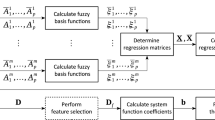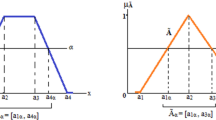Abstract
Fuzzy Optimization models and methods has been one of the most and well studied topics inside the broad area of Soft Computing. Particularly relevant is the field of fuzzy linear programming (FLP). Its applications as well as practical realizations can be found in all the real world areas. As FLP problems constitute the basis for solving fuzzy optimization problems, in this paper a basic introduction to the main models and methods in FLP is presented and, as a whole, Linear Programming problems with fuzzy costs, fuzzy constraints and fuzzy coefficients in the technological matrix are analyzed. But fuzzy sets and systems based optimization methods do not end with FLP, and hence in order to solve more complex optimization problems, fuzzy sets based Meta-heuristics are considered, and two main operative approaches described. Provided that these techniques obtain efficient and/or effective solutions, we present a fuzzy rule based methodology for coordinating Meta-heuristics and in addition, to provide intelligence, we propose a process of extraction of the knowledge to conduct the coordination of the system.
Similar content being viewed by others
References
Bellman R.E., Zadeh L.A. (1970) Decision making in a fuzzy environment. Management Science, 17(B(4): 141–164
Berthold M., Hand D.J. (2003) Intelligent data analysis: an introduction. Springer, New York
Blanco A., Pelta D., Verdegay J.L. (2002) A fuzzy valuation-based local search framework for combinatorial problems. Fuzzy Optimization and Decision Making 1: 177–193
Bonissone, P. P., Cadenas, J. M., Garrido, M. C., & H ernandez, J. J. (2007). Minería de datos en el modelado de un sistema metaheurístico cooperativo: Una comparativa. V Congreso Español sobre Metaheursticas, Algoritmos Evolutivos y Bioinspirados, MAEB’2007, pp. 1–8.
Cadenas J.M., Verdegay J.L. (1997) Using fuzzy numbers in linear programming. IEEE Transactions on Systems, Man, and Cybernetic 27(B)(6): 1017–1022
Cadenas, J. M., Garrido, M. C., Hernandez, L. D., & Muñoz, E. (2006). Towards the definition of a data mining process based in fuzzy sets for cooperative metaheuristic systems. 11th International Conference on Information Processing and Management of Uncertainty in Knowledgebased Systems, IPMU’2006, pp. 2828–2834.
Cadenas, J. M., Garrido, M. C., & Muñoz, E. (2007). A cooperative systems of metaheuristics. 7th International Conference on Hybrid Intelligent Systems, HIS 2007, pp. 120–125.
Campos L., Verdegay J.L. (1989) Linear programming problems and ranking of fyzzy numbers. Fuzzy Sets and Systems 32: 1–11
Delgado M., Verdegay J.L., Vila M.A. (1987) Imprecise costs in mathematical programming problems. Control and Cybernet 16(2): 113–121
Delgado M., Verdegay J.L., Vila M.A. (1989) A general model for fuzzy linear programming. Fuzzy Sets and Systems 29: 21–29
Dubois D., Prade H. (1983) Ranking of fuzzy numbers in the setting of possibility theory. Information Science 30: 183–244
Fedrizzi M., Kacprzyk J., Verdegay J.L. (1991) A survey of fuzzy optimization and fuzzy mathematical programming. In: Fedrizzi M., Kacprzyk J., Roubens M. (eds) Interactive fuzzy optimization. Springer Verlag, Berlin, pp 15–28
Ishibuchi H., Tanaka H. (1990) Multiobjective programming in optimization of the interval objective function. European Journal of Operational Research 48: 219–225
Pisinger D. (2005) Where are the hard knapsack problems?. Computer and Operations Research 32(9): 2271–2284
Rommelfanger H., Hanuscheck R., Wolf J. (1990) Linear programming with fuzzy objectives. Fuzzy Sets and Systems 29: 31–48
Sancho-Royo A., Verdegay J.L., Vergara E. (1999) Some practical problems in fuzzy sets-based DSS. MathWare and Soft Computing 2−3: 173–187
Tanaka H., Okuda T., Asai K. (1974) On fuzzy mathematical programming. Journal of Cybernetics 3(4): 37–46
Tanaka H., Ichihashi H., Asai F. (1984) A formulation of fuzzy linear programming problems based a comparison of fuzzy numbers. Control and Cybernet 13: 185–194
Verdegay, J. L. (1982). Fuzzy mathematical programming. In M. M. Gupta & E. Sanchez (Eds.), Fuzzy information and decision processes (pp. 231–237). North Holland: Elsevier Science.
Verdegay J.L., Vergara E. (2000) Fuzzy termination criteria in knapsack problem algorithms. Mathware and Soft Computing 2-3: 89–97
Verdegay J.L., Vergara E. (2002) Fuzzy sets-based control rules for terminating algorithms. Computer Science Journal 10(1): 9–27
Verdegay J.L., Yager R.R., Bonissone P.P. (2008) On heuristics as a fundamental constituent of soft computing. Fuzy Sets and Systems 159: 846–855
Zadeh, L. A. (1975). The concept of a linguistic variable and its applications to approximate reasoning. Part I, Information sciences, 8, 199–249, Part II, Information sciences, 8, 301–357, Part III, Information sciences, 9, 43–80.
Zimmermann H.J. (1976) Description and optimization of fuzzy systems. International Journal of General Systems 2: 209–215
Zimmermann H.J. (1987) Fuzzy sets, decision making, and expert systems. Kluwer Academic Publishers, Boston
Author information
Authors and Affiliations
Corresponding author
Rights and permissions
About this article
Cite this article
Cadenas, J.M., Verdegay, J.L. Towards a new strategy for solving fuzzy optimization problems. Fuzzy Optim Decis Making 8, 231–244 (2009). https://doi.org/10.1007/s10700-009-9062-5
Published:
Issue Date:
DOI: https://doi.org/10.1007/s10700-009-9062-5




